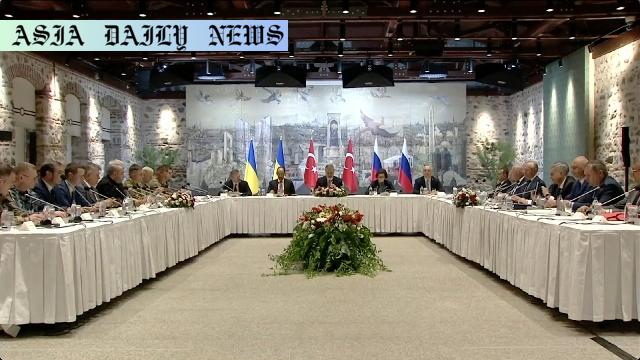Ceasefire talks between Ukraine and Russia are taking place in Turkey, with delegates meeting for the first time since March 2022.
Ceasefire negotiations between Russia and Ukraine are hosted in Istanbul, Turkey.
Delegates are meeting face-to-face for the first time since March 2022.
Ukraine requests a 30-day ceasefire, but Russia rejects this proposal.
Russia demands Ukraine give up on NATO membership and territorial concessions.
US Secretary of State Marco Rubio and Turkish officials join the discussions.

Historic Meeting of Delegates in Istanbul
Ceasefire negotiations between Ukraine and Russia began in Istanbul, Turkey, marking the first face-to-face talks between the two nations since March 2022. Both countries are represented by senior figures, with Russia’s delegation led by Vladimir Medinsky, an experienced aide to President Vladimir Putin, and Ukraine represented by Defense Minister Rustem Umerov. The importance of these talks cannot be overstated, as they may pave the way for a potential breakthrough in the prolonged and devastating conflict that began in February 2022.
The significance of Turkey’s role as a mediator highlights its increasing influence in global diplomacy. Turkish authorities, including US and Turkish officials, are present at the discussions to facilitate constructive dialogue. However, the absence of key world leaders such as Russian President Vladimir Putin and US President Donald Trump has dimmed hopes for immediate resolutions as delegates navigate the complexities of the conflict without direct executive authorities involved.
Contentious Issues in Negotiations
The demands placed on the table have underscored the challenges of brokering a ceasefire. Ukraine’s proposal for a 30-day ceasefire was swiftly dismissed by Russia, which cited the need to address what it perceives as the “root causes” of the conflict. Russia has longstanding conditions, including Ukraine relinquishing aspirations to join NATO and affirming territorial concessions related to regions like Crimea and Donbas. These demands remain non-negotiable from Moscow’s perspective, creating a wide chasm between the two sides. Without significant compromises, the path to peace remains obscured.
Ukraine’s insistence on its sovereignty and territorial integrity represents its core stance. Kyiv’s delegation, backed by President Volodymyr Zelenskyy’s government, is under tremendous pressure to ensure any agreement safeguards Ukraine’s long-term independence and security. However, with Moscow’s unyielding position on NATO and territory, the prospects for immediate progress appear dim.
The Role of Global Stakeholders
The presence of US Secretary of State Marco Rubio and other global figures has lent additional gravity to the talks. Although Rubio expressed skepticism regarding the outcomes, he emphasized the importance of dialogue. Rubio stated that achieving a meaningful result likely requires direct engagement between heads of state like President Putin and former US President Donald Trump. Notably, Trump has expressed his willingness to engage in dialogue with Putin but has yet to formalize any plans for such a meeting.
The international community remains divided on the best course of action. While some support Ukraine’s steadfastness, others advocate for more concessions to expedite a resolution. These diverse opinions mirror the broader geopolitical complexities of the conflict, where economic, strategic, and humanitarian stakes are deeply intertwined.
Outlook and Implications
The ongoing negotiations in Istanbul underscore the prolonged and painful nature of conflict resolution in international diplomacy. With entrenched positions on both sides, it remains unclear whether these talks will yield any substantive breakthroughs. The immediate priority for Ukraine is to achieve a ceasefire that saves lives and buys time for more comprehensive discussions. For Russia, maintaining strategic advantages while addressing its stated concerns about NATO expansion remains critical.
Regardless of the outcomes, the talks highlight the need for relentless pursuit of peace. The toll of the conflict on civilians, infrastructure, and global stability has become unsustainable. The international community must exercise both patience and pressure, ensuring that dialogue continues despite setbacks. The road to peace is fraught with obstacles, but it is a journey that must be undertaken to alleviate human suffering and restore stability.
Commentary
The Fragility of Ceasefire Talks
The ongoing talks between Ukraine and Russia in Turkey serve as a stark reminder of the fragility of peace negotiations in the face of deep-rooted hostilities. As both sides present conflicting demands with little room for compromise, the world watches anxiously, hoping for progress. These discussions, while symbolically important, reveal the immense challenges inherent in resolving such a complex conflict.
One critical issue is the absence of key leadership figures, including Vladimir Putin and Volodymyr Zelenskyy, from direct negotiations. Their presence could potentially bridge gaps and expedite decision-making. However, given their prolonged public disagreements and contrasting national interests, even their involvement might not guarantee a resolution. Nonetheless, their engagement would undoubtedly signal a strong commitment to finding common ground.
The Importance of Mediators
Turkey’s role as a mediator highlights the necessity of neutral parties during peace processes. By hosting these talks, Turkey positions itself as an essential player in international diplomacy. However, the involvement of mediators also poses challenges, as impartiality and effectiveness depend on building trust among conflicting sides. In this case, the support and presence of the United States add weight to the process, although the skepticism voiced by figures like US Secretary of State Marco Rubio signifies the pervasive pessimism surrounding the talks.
Moving Forward
The path forward is fraught with uncertainty. Ukraine and Russia’s rigid stances on critical issues like NATO membership and territorial sovereignty underscore the complexities of these discussions. Still, it is imperative that such negotiations continue, even in the face of repeated failures, as the cost of abandoning dialogue is far too great. Finding pathways to incremental agreements, such as a temporary ceasefire or limited humanitarian corridors, could serve as building blocks toward a more comprehensive peace.
The Istanbul talks, despite their uncertain outcomes, provide a beacon of hope for eventual resolution. As painful and drawn-out as this process may be, every step toward dialogue represents progress in a conflict that has caused immense suffering. The world must continue to support and facilitate these efforts, keeping the ultimate goal of peace firmly in sight.


